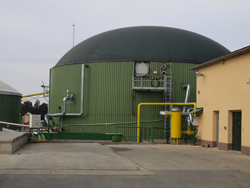Bacterial ‘recyclation’ of waste for energy use
Waste buried in a landfill continues to generate biogas for many years. This biogas can be refined and used as a substitute for natural gas for cooking and heating in homes and businesses. In addition, anaerobic digester systems are of interest to both the agriculture sector and to waste water treatment, where animal and human waste can be treated to reduce bacteria that pollutes water supplies and simultaneously to reduce methane released into the atmosphere, which has been targeted as a major contributor to global warming. The ‘Increased renewable energy recovery from biomass by highly efficient disruption process’ (Biowell) project was designed to develop an optimised anaerobic digestion system increasing the biogas output of a plant. Specifically, the researchers developed an innovative biomass pre-treatment process based on ultrasound activation of various enzymatic systems. A prototype Biowell system was developed along with software for automated control. The system was evaluated extensively in functionality tests under industrial conditions. The results supported the potential for enhanced biogas production using homogenisation of biomass and enabled identification of biomass parameters affecting biogas yields. The researchers outlined a plan for Biowell sustainability and performance improvement along with a commercialisation strategy. The results should have significant impact on numerous industries in their efforts to harness energy generated by anaerobic digestion of biomass, including the food and beverage industry, the pharmaceutical industry and the agriculture sector.







